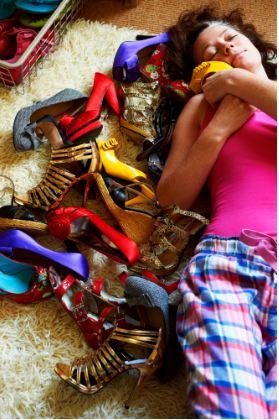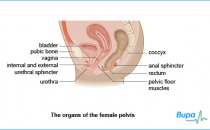Obsessive-compulsive disorder

About two in 100 people are affected by OCD. It's often diagnosed in young adults, and affects more women than men. About one in 100 children may have OCD.
About OCD
Symptoms of OCD
Causes of OCD
Diagnosis of OCD
Treatment of OCD
Living with someone with OCD
About OCD
If you have OCD, you may have repeated obsessions and/or compulsions that make you feel anxious. Everyone has unwanted, troubling thoughts occasionally, for example, worrying that the oven has been left on. But if you have OCD, these thoughts are more common and can seem more important.
Symptoms of OCD
OCD symptoms vary from mild to severe. They include obsessions (thoughts or feelings) that make you feel distressed or anxious, and compulsions (actions) which you feel necessary to perform to cancel out the obsession. It is most common to have both obsessions and compulsions, but you can also have either alone. You may have more than one obsession and/or compulsion.
The most common obsessions are:
- thinking or feeling objects are dirty or contaminated
- worrying about health and hygiene
- fear about safety and security, for example, doors left unlocked or appliances left switched on
- pre-occupation with order and symmetry
- religious or anti-religious thoughts
- disturbing thoughts about aggression or sex
- the urge to hoard useless things
You may carry out compulsive behaviours to counteract the anxiety caused by your obsessions. These may be obvious actions, or just things you do in your mind.
The most common compulsions are:
- checking to make sure things are safe (such as gas taps and locks)
- cleaning and washing, either yourself (eg, hand washing), or your surroundings
- repeating acts in a particular way
- mental compulsions (eg, repeating certain phrases or prayers in your mind)
- ordering things for symmetry or exactness
- hoarding or collecting things that are useless
Compulsions are usually related to the type of obsession you are experiencing. For example, you may repeatedly wash your hands if you have obsessions about dirt or contamination. You may feel that something terrible will happen if you don't carry out your compulsions. Performing the compulsion may make you feel better in the short term but this feeling doesn't last.
People with OCD are usually, but not always, aware that their thoughts or actions are unreasonable. It’s common to feel guilty, disgusted, depressed or embarrassed about it. Compulsive behaviours can be very time consuming, often getting in the way of normal work and family life.
If you have OCD you may also have depression. This may be due to the emotional strain of dealing with obsessions, or because OCD and depression involve similar chemical imbalances in the brain.
OCD can upset your family life or damage your relationship with a partner, which may lead to separation or divorce.
Causes of OCD
The exact cause of OCD isn’t known, but it's probably due to a combination of factors.
Sometimes OCD runs in families. So if your mother, father, or sibling has OCD you have a higher chance of developing it.
Life events such as a new child, changes in relationships or death of a close relative may trigger OCD in some people. Particular personality types, especially perfectionists, are more prone to OCD.
OCD has been linked to increased activity in certain parts of the brain and a decreased level of a natural chemical called serotonin. This chemical is important in the control of mood.
In some children, OCD develops after a streptococcal infection – a type of bacterial infection.
Diagnosis of OCD
OCD can be extremely distressing. If you feel your life is being affected by the disorder, you should visit your GP.
Your GP will ask about your symptoms and examine you. He or she may also ask you about your medical history. You may be referred to a psychiatrist (a doctor who specialises in mental health), a psychotherapist or a counsellor for further help.
Treatment of OCD
Getting professional help is the best way to deal with OCD. Treatment can help you to gain control over your obsessions and to stop carrying out compulsions. Treatment may include psychological treatments, medicines or a combination of these.
Self-help
Self-help books, CDs and DVDs, and support groups can be helpful. Ask your GP for recommendations.
It can help to write down your obsessive thoughts rather than try to suppress them, in order to get more control of them. In fact, when you try to push a thought away, the opposite often happens – you bring it to mind. On the other hand, try to resist carrying out compulsive behaviour or thinking, because each time you give in to it, your belief that it can stop bad things happening gets stronger.
Don't use recreational drugs or alcohol to control your feelings as this can have a negative impact on your health and wellbeing.
Some people find relaxation techniques or exercise improves their anxiety.
Talking treatments
The most effective types of talking treatment for OCD are those that help people adapt their behaviour or the way that they think (cognition).
Cognitive behavioural therapy (CBT) is usually recommended first. It involves sessions with a therapist either individually (in person or over the phone), or in a group. The therapist will usually suggest a type of therapy called exposure and response prevention therapy.
This involves gradually learning to confront the situation you fear (exposure) without using your usual compulsive behaviour to cope with the anxiety (response prevention). For example, if your obsession focuses on cleanliness your therapist might ask you to use a public telephone or touch a door handle without washing your hands afterwards.
Although many people find exposure response therapy distressing to begin with, the anxiety associated with the situation gradually eases as you learn to deal with your fear. The number of sessions you need depends on how severe your OCD is.
Medicines
Your GP or psychiatrist may prescribe medicines to treat OCD. The most effective medicines aim to restore the balance of serotonin in the brain. These drugs, such as selective serotonin re-uptake inhibitors (SSRIs), are also used to treat depression, and work by reducing feelings of anxiety. Clomipramine (Anafranil), a different type of antidepressant, is another option.
It can take at least 12 weeks after starting medicines for OCD before you notice an improvement. Your doctor may need to increase your dose if initial doses don’t help. You will need to continue taking SSRIs for at least a year. People react to SSRIs differently, so you may need to try a number of medicines before you find the right one for you. If you stop medication, you will usually be advised to do so gradually, as your symptoms may return once you stop taking the medicine.
Hospital treatment
Most people don't go into hospital for OCD unless they have another mental health problem, such as an eating disorder or schizophrenia. If you have very severe symptoms, you can't look after yourself properly or if you have thoughts about suicide, your GP may suggest further treatment.
Brain surgery is not recommended as a treatment for OCD. However, very rarely, if your OCD is severe and other treatments haven’t helped, you may be eligible for surgery. Your doctor will first need to assess whether you are suitable for surgery. You will need to give your consent before any surgery can take place.
Living with someone with OCD
If your friend or relative has OCD, you can help by encouraging him or her to ask his/her GP for help. This may be difficult as sometimes people with OCD may not be ready or want to ask for help.
If your friend or relative chooses exposure and response prevention therapy, encourage him or her to tackle difficult situations, and don’t take part in their rituals or checking.
Don't worry that someone with an obsessive fear of being violent will actually perform their thoughts – it's very rare for someone to do this.
How will my GP know if I have OCD?
Do the medicines that can help to control OCD have any side-effects?
Is body dysmorphic disorder similar to OCD?
How will my GP know if I have OCD?
Answer
Your GP will ask you some questions about your symptoms and how they are affecting your everyday life.
Explanation
You may find it difficult to talk about your symptoms, but you should try to remember that your GP has probably seen lots of people with the same type of problem before. He or she will consider how much distress your symptoms are causing you and how much they are affecting your day-to-day life.
You may only have mild symptoms of OCD which you find distressing but are manageable. However, if you have more severe symptoms, then they will seriously restrict how you live your everyday life.
Your GP will work with you to decide on the best course of treatment. He or she can also tell you about self-help or support groups that you could go to in your area.
Do the medicines that can help to control OCD have any side-effects?
Answer
Yes, the drugs that are prescribed to help control the symptoms of OCD can have some side-effects.
Explanation
Selective serotonin re-uptake inhibitors (SSRIs) are often prescribed to help control the symptoms of OCD. You may get some side-effects while taking these drugs, especially during the first few weeks. Side-effects can include nausea, headaches, trouble sleeping and feeling anxious or agitated. This may make your symptoms seem worse at first, but eventually they will settle.
A different type of drug, called clomipramine, can also be used to treat OCD. The side-effects of this drug include a dry mouth, blurred vision, constipation, drowsiness and dizziness.
Your medication can take at least 12 weeks to start working. It's important that you don't suddenly stop taking it without speaking to your GP. If you stop, or forget to take your medication, then you may get withdrawal symptoms such as headaches, dizziness, nausea and anxiety.
Always read the patient information leaflet that comes with your medicine and ask your GP if you have any questions.
Is body dysmorphic disorder similar to OCD?
Answer
Body dysmorphic disorder (BDD) and OCD are separate conditions, but they do have some similarities.
Explanation
BDD is a condition that causes you to spend a lot of time being concerned about how you look. If you have BDD, you will usually be worried that you have one or more physical flaws. Most of us worry about our appearance at some time, but if you have BDD, your preoccupation with your appearance can make you feel distressed and may affect how you live your day-to-day life.
The similarity with OCD is that if you have BDD, you may feel like you need to repeat certain acts. These acts may include frequently checking what you look like or asking for reassurance about your appearance. Other examples include repeatedly applying your make-up, or picking your skin to make it 'smooth'. If you have BDD, you may feel like you can't go out in public unless you have hidden your 'flaws' with certain make-up or clothing.
The treatment for BDD is very similar to treatment of OCD. You will usually be offered cognitive behavioural therapy (CBT). If this doesn't have any effect, then your doctor may prescribe medication to help control your symptoms.
Further information
OCD Action
0845 390 6232
www.ocdaction.org.uk
OCD UK
www.ocduk.or
Mind
0845 766 0163
www.mind.org.uk
Sources
•Simon C, Everitt H, Kendrick T. Oxford handbook of general practice. Oxford: Oxford University Press. 2005:964
•Obsessive-compulsive disorder. Clinical Knowledge Summaries. www.cks.nhs.uk, accessed 26 June 2009
•Obsessive-compulsive disorder: core interventions in the treatment of obsessive-compulsive disorder and body dismorphic disorder. National Institute for Health and Clinical Excellence •(NICE), 2005. www.nice.org.uk
Obsessive-compulsive disorder. Royal College of Psychiatrists. www.rcpsych.ac.uk, accessed 26 June 2009
•Understanding obsessive compulsive disorder. Mind, 2008. www.mind.org.uk















